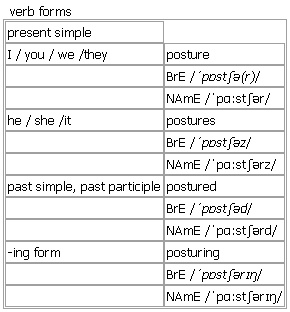|
Từ điển Oxford Advanced Learner 8th
 posture
posture
pos·ture [posture postures postured posturing] noun, verb BrE [ˈpɒstʃə(r)] NAmE [ˈpɑːstʃər]
noun
1. uncountable, countable the position in which you hold your body when standing or sitting
•a comfortable/relaxed posture
•upright/sitting/supine postures
•Good posture is essential when working at the computer.
•Back pains can be the result of bad posture.
2. countable, usually singular your attitude to a particular situation or the way in which you deal with it
•The government has adopted an aggressive posture on immigration.
Word Origin:
late 16th cent. (denoting the relative position of one thing to another): from French, from Italian postura, from Latin positura ‘position’, from posit- ‘placed’, from the verb ponere.
Example Bank:
•Michael gulped as he struggled to regain his posture.
•She has very good posture.
•a poor posture for driving
•the normal upright posture
•to adopt a threatening posture towards an opponent
•Back pains can be the result of bad posture.
•Facial expressions and body posture can show a speaker that you are listening.
•Try to maintain an upright posture and keep your voice low and clear.
verb intransitive ~ (as sth) (formal)
to pretend to be sth that you are not by saying and doing things in order to impress or trick people
Verb forms: 
Word Origin:
late 16th cent. (denoting the relative position of one thing to another): from French, from Italian postura, from Latin positura ‘position’, from posit- ‘placed’, from the verb ponere.
|
|
|
▼ Từ liên quan / Related words
Related search result for "posture"
|
|
